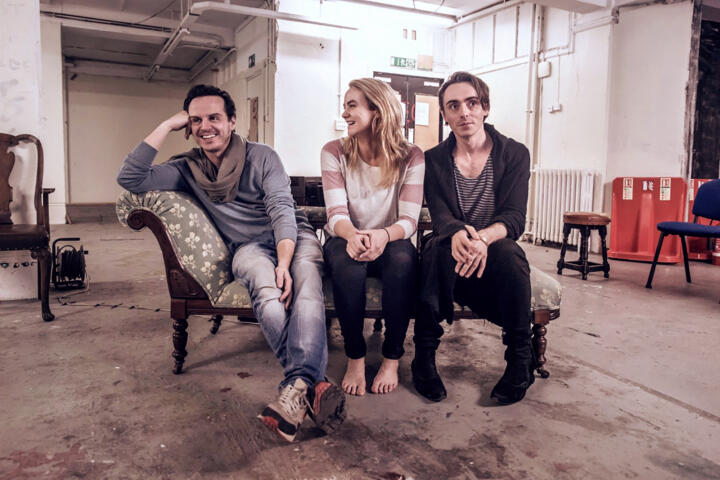The Dazzle | Extras
The Dazzle– Inside the Rehearsal Room
Director Simon Evans discusses The Dazzle with MGCfutures Education Associate Dominic Francis, providing an insight into the challenges of taking the play from page to stage
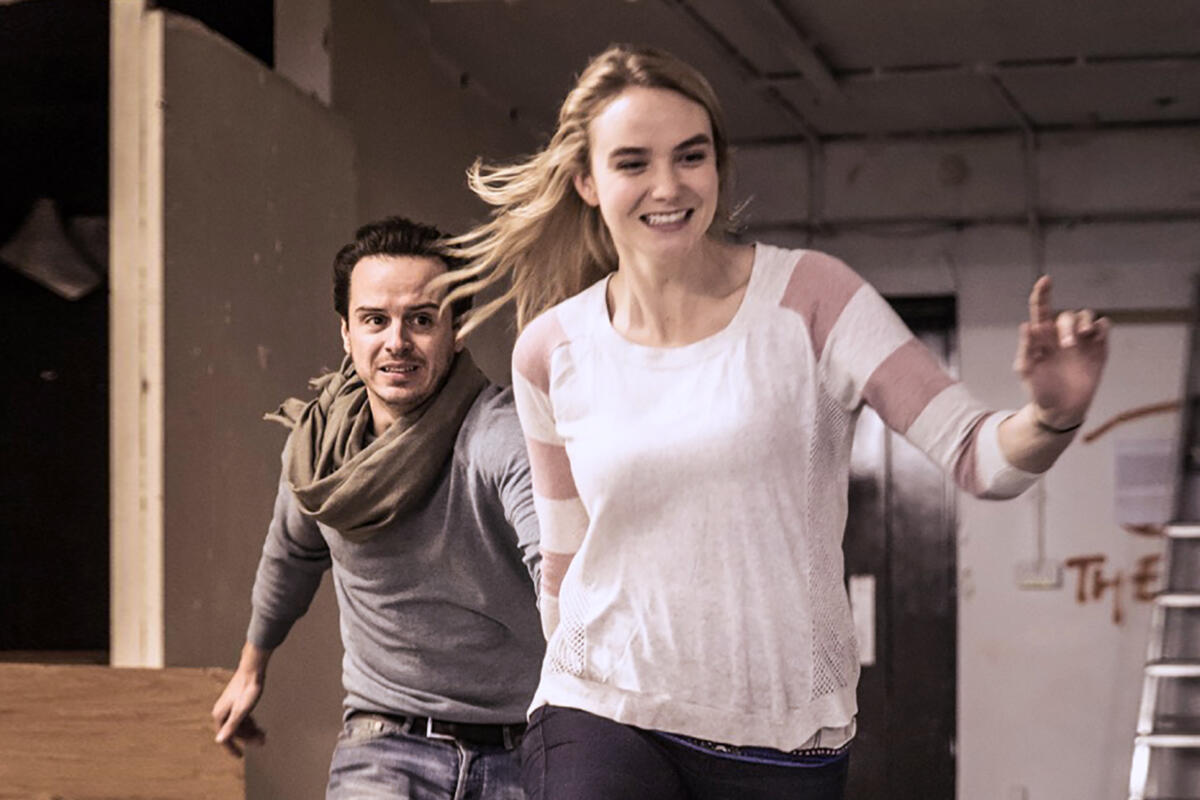
How did this production come about? Was The Dazzle a play you’d read and wanted to direct for a long time?
About four years ago I was asked to direct something at the Print Room in Notting Hill and the only specification was that it had to be a one, two or three-person play. I came across a piece by Richard Greenberg called The Violet Hour and I mentioned it to Jamie Lloyd, whom I was assisting at the time on The Duchess of Malfi at the Old Vic Theatre, and he said, ‘The Violet Hour’s brilliant’ and I replied, ‘It is but it’s a cast of six so it’s not do-able’. Then he asked, ‘Have you read The Dazzle?’ So I sought that out. It’s very rare that you read a play the first time and are completely engaged by it and switch off your analytical brain, but that’s what I did. I went straight through The Dazzle in one sitting and at the end of it thought, ‘That was absolutely incredible!’
Because of issues with rights the play couldn’t happen at the Print Room, but it’s stuck with me for four years. It’s been one I’ve always wanted to do – I’ve absolutely adored it. I don’t know what it is about it, though, but I’ve heard from various people that it doesn’t come off the page very well. It did for me, but for other people who’ve read it – even people who’ve worked on this production – they’ve said, ‘I read it the first time and didn’t quite get it, then I heard it out loud and I got it!’
I’d shown the play to a number of people when I’d been invited into meetings but it had never got traction, and I’d always thought, ‘Am I missing something here?’ So I decided to grab the bull by the horns and do a rehearsed reading of it. I contacted Andrew Scott and he came and did it. I contacted Bertie Carvel, whom I knew, and he read the role of Homer. We asked an actress called Joanna Christie to read Milly and we just did it. We invited people to come and hear the play and it got traction. Suddenly everyone wanted it.
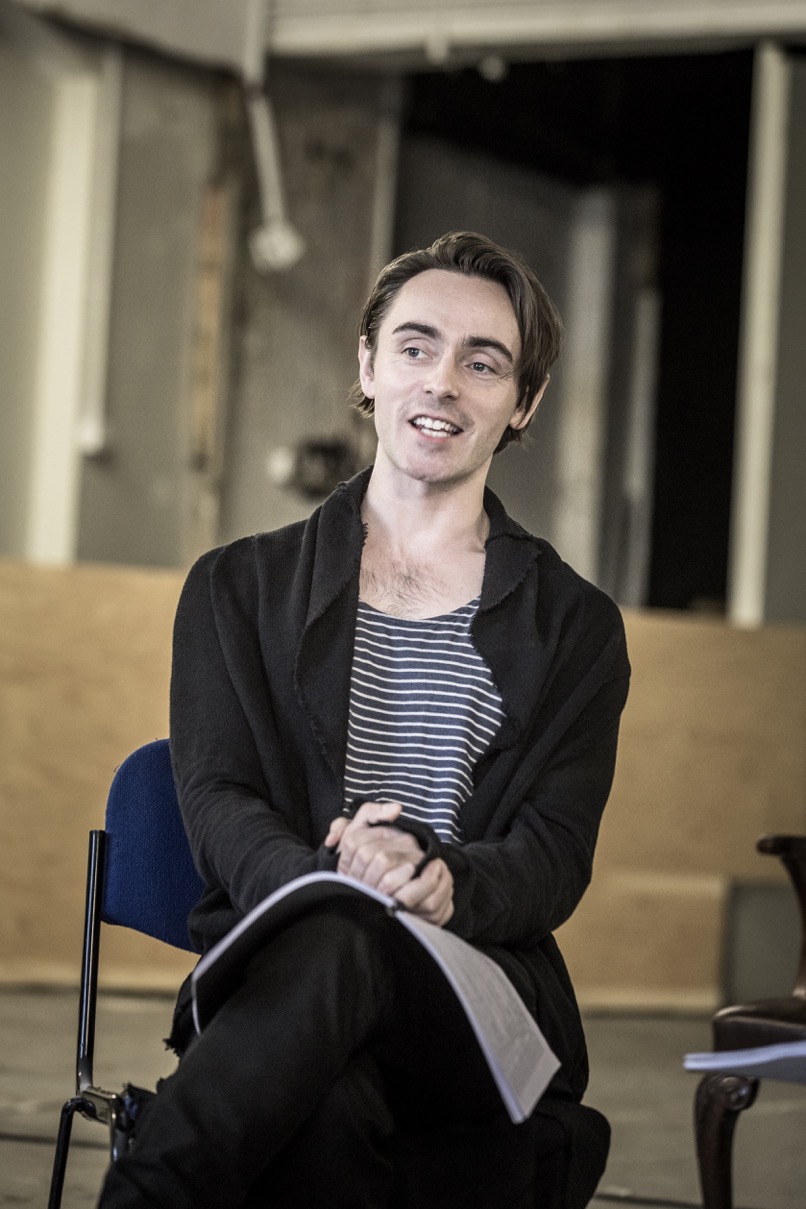
So how did the Michael Grandage Company come to be involved in a co‑production with Emily Dobbs Productions?
The first thing that happened was on the back of that reading we got a lot of interest from various West End producers. A lot of people wanted it to go into a large commercial venue and the only person who was available and really keen to take it to full production was Andrew. Bertie was interested but had a lot of theatre on and wasn’t in a place to commit and Jo was going back to America.
But Andrew said he wanted to do it, which of course for me was magnificent – what an actor to get! He and I had spoken about it a lot and there was something about the reading we did, which was in Trafalgar Studios Two – in that tiny, little space – that was magical. And we said: ‘There’ll be something wrong about taking the scale of it up to the nth degree. There’s something wrong about putting it in a theatre in front of five, six, seven hundred people. We want the audience to be in amongst the clutter.’
We had a vague idea about a found space option, which I’d had years ago, but never thought I’d get somebody like Andrew Scott to do it. So I went to the Michael Grandage Company and said, ‘What about this?’ I think MGC had wanted to explore site-specific theatre for a while, so this came at an appropriate time, and they said, ‘We’ll help you with that’.
So I then began exploring different venues, trying to find the right space. I’d done a lot of work for Secret Cinema five, six years ago when we were in the depths of a recession and finding an unused building then was easy – they were everywhere. Now, suddenly the economy’s improved and you can’t get them for love nor money. It’s ridiculous!
The problem we had was the audience for traditional West End theatre was not the Secret Cinema or Punch Drunk audience. They’re not the audience that wants to travel to Mile End or Bethnal Green, or up to Angel and beyond to see something. They want to feel like they’re seeing something magical and unique, but there’s something about the unfamiliarity of a found space coupled with a relatively unknown director that, even with someone like Andrew attached, made us all a little nervous. Then I heard that Emily Dobbs was running the old St Martin’s Art School, now Found 111, and we came to have a look around and said, ‘This ticks all the boxes’.
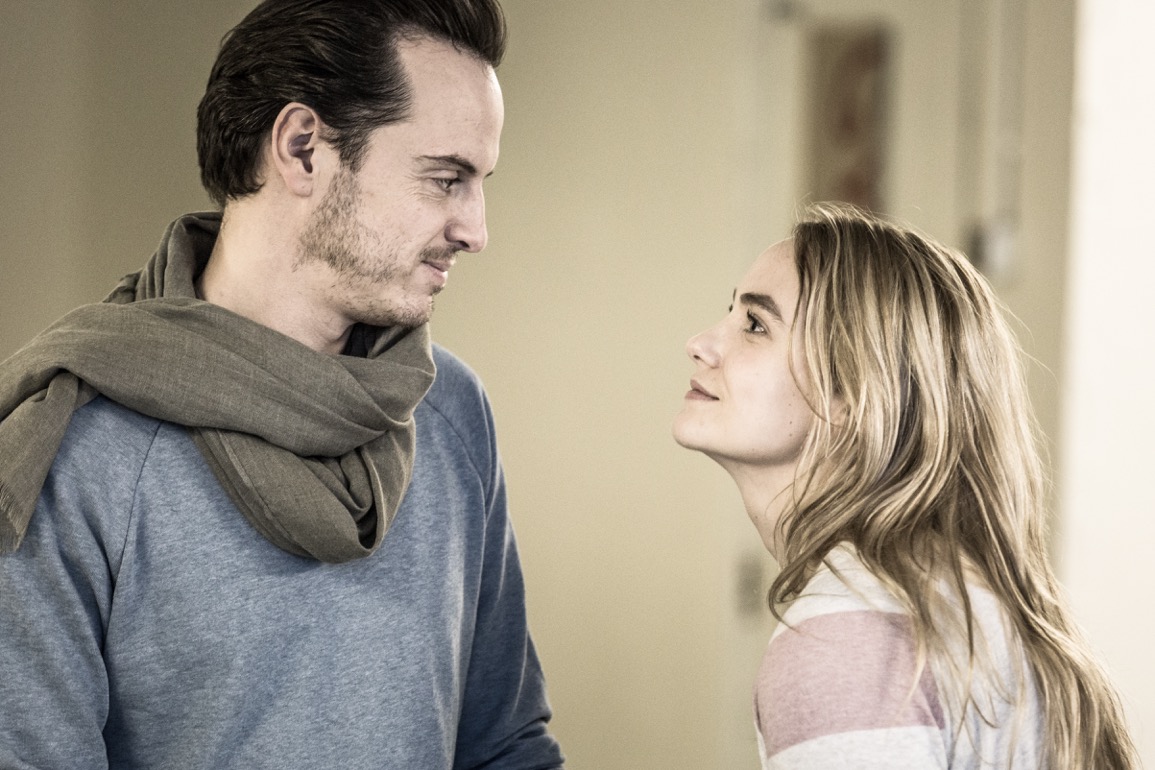
What is it about a found space that makes it right for this play?
There are two things. The story of these brothers is the story of two people who barricade themselves away from civilization and society. For reasons that the play explores their natures mean they are no longer allowed access to the world that Homer Collyer wants to be a part of, which is a world of society and art and beauty and dances. It’s set in the early twentieth century, so we’re talking about the birth of the jazz scene in Harlem. The birth of that whole period.
There was something about looking around a West End theatre, which we did, that made us think: ‘This doesn’t feel right. It feels like we’re sitting out here in a world of civility and they’re in their own squalor, and that’s not what it should be.’ That’s the first principle.
The second point is that I’ve become very interested in the relationship between an audience and an actor. It’s not about breaking the fourth wall – that’s always there – it’s to what degree we sit in comfort while the story happens, or to what degree we have to enter that world and what that does to us in return. Certainly for a story like this, a story which is unknown, where the writer takes liberties with the characters based on their actual historicity, it’s lovely to surprise an audience as well. You have to step into their world.
And that’s what’s beautiful about the building we’re in now. An audience comes in through this little door off the street, they walk up seventy-one steps, around this antique lift-shaft, and every one of those steps, I feel, is something unusual and a journey into a world where strange and slightly magical things are going to happen.
It is a play, I think, that is verbose. It’s a play where the characters are heightened. There’s a lot in that room that somehow if you frame it with a proscenium arch, I think people might disengage from the affectation of it. They might simply admire it as they would an Oscar Wilde or Noel Coward play – plenty to admire, but you don’t necessarily lose yourself in it in quite the same way. And that’s what we wanted to do because I thought the story had such potential to be sad and tragic. And to be close enough to acting of that calibre, going through pathos at that level, where there are tears, where everything is so visible to everybody, was such a thrill
We looked at various studio spaces and, again, you sit on rather nice comfy seats and it always felt like you weren’t in their world, you were only staring at it. And it was interesting to think about that as well, because the play is about the world inside their house and the world outside it. And the world outside is civility: it’s civilization, it’s the world moving on – chucking rocks at them, throwing things through the window. And then there’s the world in the house and I desperately wanted the audience to be in it, not out of it. Because if they’re outside they’re the people throwing the stones. They’re the people judging them and sneering at them. When you’re inside you’re complicit somehow.
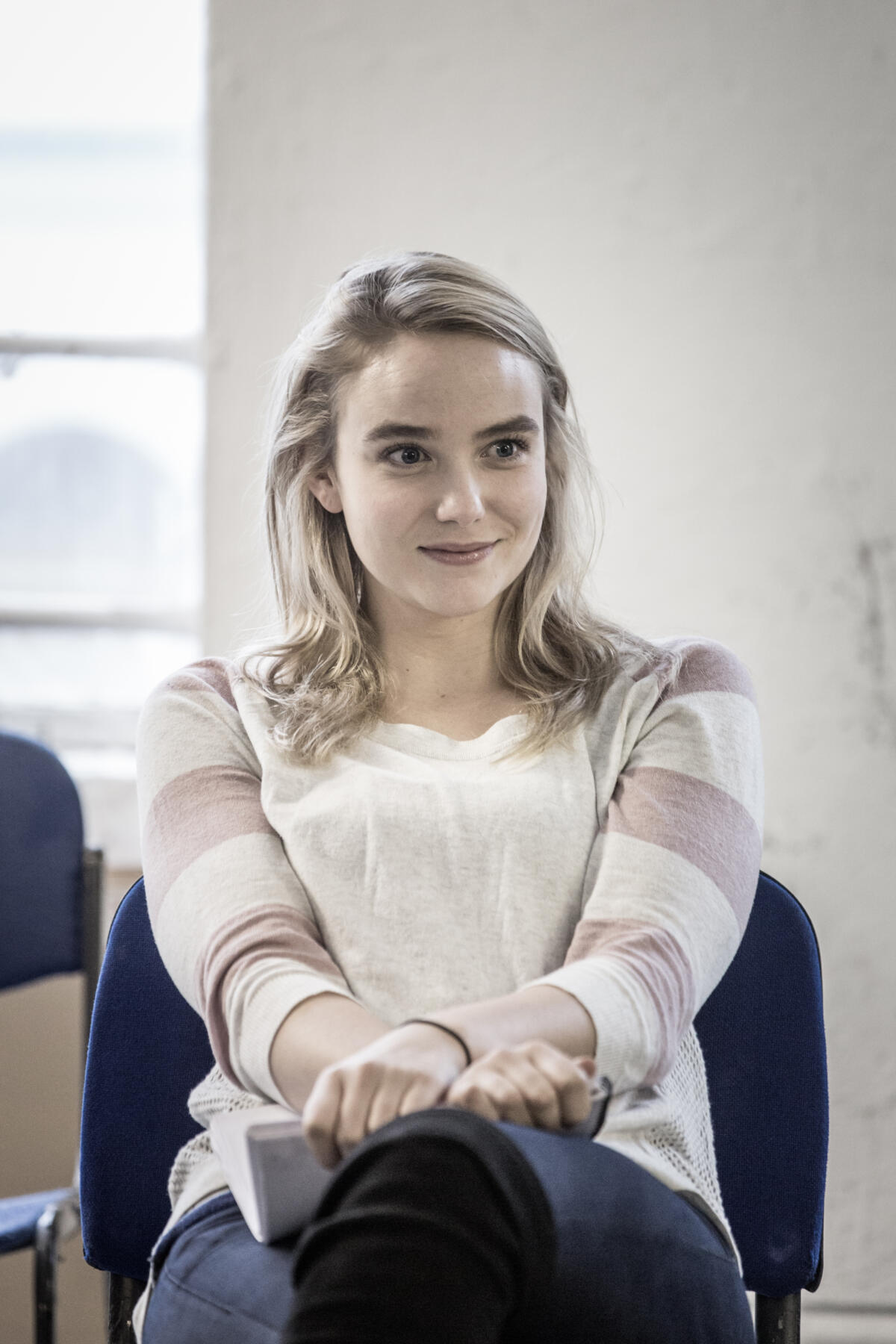
What are the challenges of working in a found space such as this?
The first purely practical thing is that they’re not built to be theatres. With a found space the most basic amenities are not there: lights, plumbing, central heating, etc. None of those things that make a comfortable environment. And you’re asking actors to go through this. With any show you’re asking them to go through a lot – you’re asking them to go on an emotional journey for you. To have to rehearse that in a place where there are mice scurrying around comes with its own challenges.
It’s different with Secret Cinema or Punch Drunk, or with the other immersive, site-specific things I’ve done, because the actors were usually younger, slightly less experienced and really up for the pure hutzpah of, ‘We’re going into a found space and it’s going to be decrepit…’ And this is what’s been remarkable about this. I’ve not found a record yet of actors of this calibre coming into a venue like this. There have been lots of things where they’ve gone into town halls and places like that, but even they have slightly more infrastructure than this space does.
But the challenge then is: How does an audience come into the space? How do you dictate their journey? How do you stage something in a room that’s not built to be a theatre? How do you handle the acoustics? Purely practically, how do you fit enough seats in to make the whole thing fund itself when there’s nowhere to put chairs? And then, once you’ve planned for all that, you’re rehearsing in a space where halfway through a scene the lights suddenly cut out! And you just have to keep saying to yourself, ‘This is in pursuit of something rather wonderful and magical’.
What discoveries did you make about the play in rehearsals?
For me the play has always been about kindness. It’s always been the story of Homer’s character and what he does for Langley through the course of the play. And in the final scene there’s Langley realising something too, and being kind to Homer in return. The story of kindness is one that meant a huge amount to me and I mentioned it in a very early conversation with Andrew about the piece.
I think it’s more straightforward to write a play about anger, or to write a play focused on an issue you feel particularly antagonistic about – whether that’s antagonism about the issue itself or in regard to somebody else’s attitude. Whatever it is, I think it’s easy to write a play about that particular issue if you’re standing on a soapbox.
So we get a lot of plays with characters shouting at one another and being violent to each other, all the different attitudes leading to that. It’s very difficult, I think, to write a play about kindness. And it’s very difficult to write a play about love that is not about romantic love, because romantic love comes with a very identifiable passion. To write a play about sibling love and kindness and to hold an audience for two hours with that is a real challenge.
On the very first day of rehearsals we did a readthrough, then said goodbye to everybody else and finally it was just me and the cast and I remember saying to them what I just said to you: ‘I think this play is important because it’s about love and kindness.’ And they took that and it was a lovely thing to go into each scene with.
Of course when you read a play or direct a scene everyone asks, ‘Where’s the conflict?’ Because that’s what everybody chews over, that’s what they love. ‘What’s the issue?’ These two characters battling it out… It was lovely instead to hear the actors start to say: ‘It is that but couldn’t it also be a moment of kindness? Could there not be a gift in there somehow? Even if it comes out of something a little bit bitey, does it not then become a kind gesture?’ And the way they all took to those moments was inspiring. The way they played sections, I could never have foreseen all the examples of that.
And when you go back and you’re noting them, talking about things, and say, ‘That moment, do you feel like you need to get higher with it?’ if it was particularly aggressive for example, and they reply, ‘No, I think it needs to be something soft’. We’d say: ‘Let’s try that again and what if this time it’s not two angry people? What if it’s two brothers teasing each other instead?’ And we’d get an insight into this language that can be playful as much as violent. And it’s lovely then to see an audience respond to those moments.
What has an audience brought to the experience, in terms of how they’ve responded to the play?
When I first read the play again I was struck by how it appears to be very much a play of two halves. The first half always felt like a Noel Coward piece with this erudite set of highly intelligent characters. It’s very witty, very eloquent – lines being thrown back and forth. The second half suddenly becomes much more like Samuel Beckett, slightly surreal. I remember reading it thinking, ‘How are we going to do this?’
Our approach was always to remember, during the first half, what the second half delivers, which is the real meat of the relationship between the two brothers. So it was slightly surprising in first previews to be reminded that the first half is very funny and to see how much an audience enjoyed that. It’s always lovely to see an audience get from it what we did.
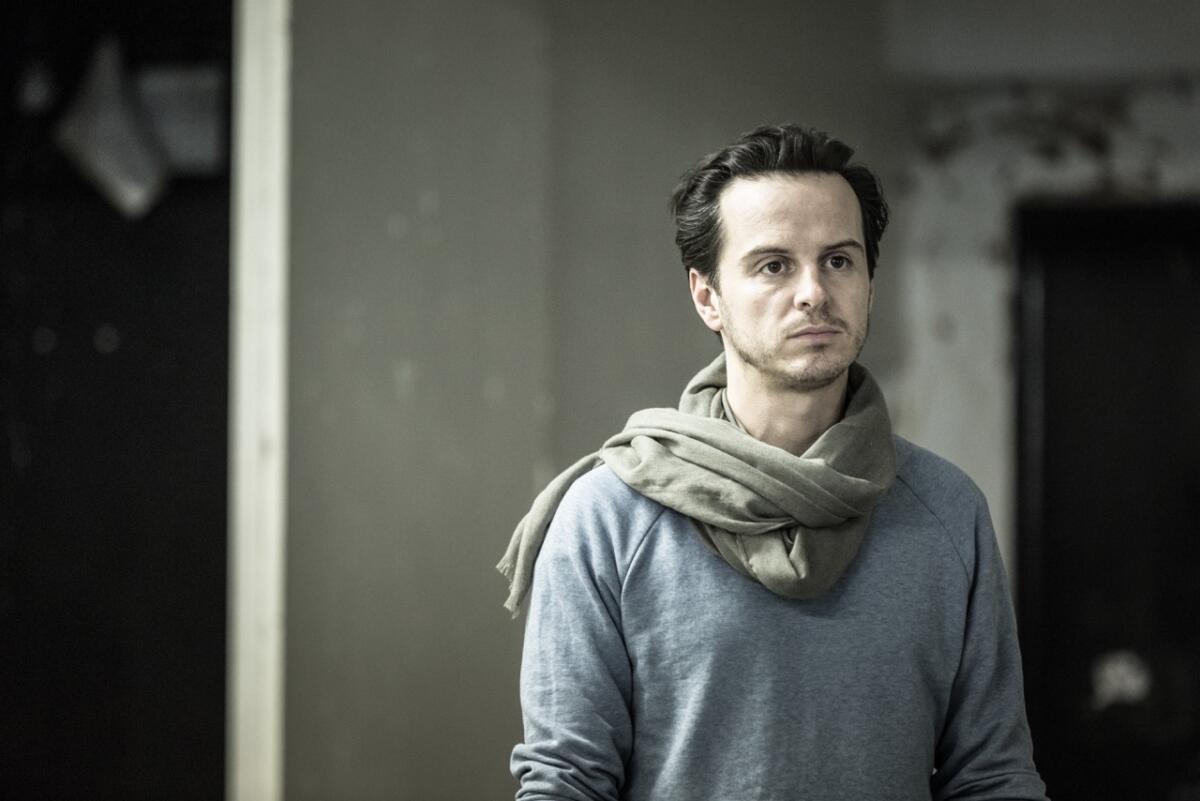
Have people approached you during the performances to talk about the play? What do they say?
I try to avoid seeing people during the interval. Because it’s been well-received I sometimes feel they come out half-way saying, ‘I’m enjoying it but there are people out there who really love it and it’s not quite delivered on that expectation yet… What’s going on?’ So I try to keep out of their way, because I don’t want to have to say, ‘Just wait’. But then they come out of the second half having had a very different experience.
It’s lovely to be backstage and sneak through at the end of the play to see people crying, to be genuinely emotionally engaged by it and come out at the end having truly felt something. The feedback includes words like ‘intense’, commenting on the ‘intimacy’ and ‘magic’ of it.
What’s one thing you’re going to take from this production as a director?
Something which I’ve been thinking about for a while, but has really been made clear to me by this experience, is that the act of going to the theatre can become a routine, staid one for people – the very mechanics of going to the theatre, sitting in a comfortable seat and watching a play that’s far removed. It’s interesting because some reviews have said what we’ve done here is an ‘immersive show’ and other people have said it’s not. What I really love is that, for all the magic, we’ve actually done a relatively straight play in an unusual space.
I’ve been very much aware of an audience coming into a space open to possibilities in a way that I don’t see them going into more traditional theatres. There’s something about people going to a venue they’ve been to before, where they say: ‘I’ll sit here and in a second the lights will go down and a play will happen. Then we’ll have an interval and I know where the bar is and I know the quickest way home.’ It engages a different part of the brain.
I’ve always thought that the best thing you can do to an audience is make them gasp. Laughter is great, tears are great, but a gasp is best. Because in that moment of complete shock you’re open to anything. You’ve no control over it, therefore you’re completely exposed and then whatever we do you’re in our hands… We can have real fun! And what I’ve really learnt from this production is that you can bring an audience into an unfamiliar space and actually give them a richer experience because of that.
